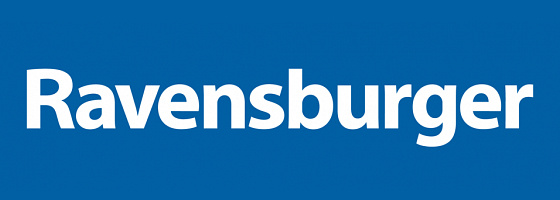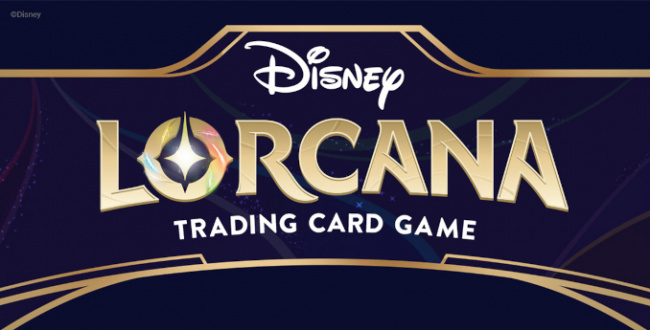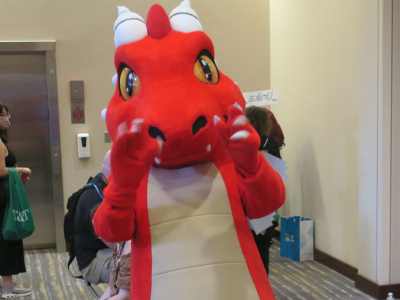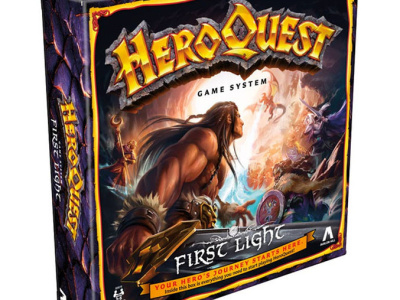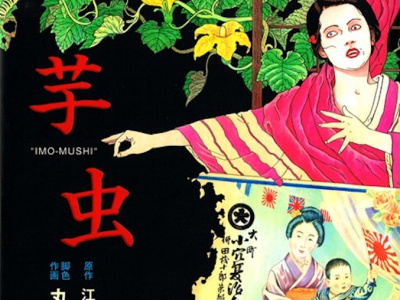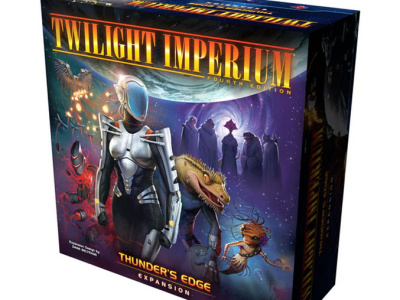We sat down with Ravensburger North America CEO Stephane Madi at Gen Con, and talked about the company's strategy for Disney Lorcana, how Ravensburger sees the roles of its channels, and more. This interview has been lightly edited for length and clarity.
ICv2: Ravensburger is a puzzle company and a board game company. To become a collectible game company is a very different skill set and a totally new business. Why did Ravensburger decide to enter this category?
Stephane Madi: It was almost a natural evolution. You said puzzles, games, these two things have publishing nature in common. We are also a very large book publisher although we don't sell those books in North America, but there is a big book business in the Germany, Austria, Switzerland region.
We've been publishing forever. That's actually how Ravensburger started, by printing books. We identify our values and mission (under the Ravensburger brand at least, because we have a few other brands as well) as products for the head, the hand, and the heart.
We create immersive content that stays with you, that creates special moments: moments to connect, moments to be together. We've developed plenty of awesome board games (you're very familiar with them I'm sure) known for their immersive art, but also their immersive content, the experience of the game being very true to the content.
From there, really, TCGs was a natural evolution of bringing this IP to life. We already had many of those strengths developed, and then with the right team on board, looks like we pulled it off.
What customer is Ravensburger targeting with Lorcana?
There is more than one customer segment. We have our core customer, let's call it the tip of the pyramid. That is the gamer; that is the TCG player; the game enthusiasts. That is the primary consumer we have in mind that enjoys playing the game.
But then the pyramid goes pretty wide. There's a Disney collector, which is really important; this is a great Disney collectible product. There are new entrants to the TCG category: many consumers that have not really had the chance to get to know trading card games, because perhaps the barrier was too high, maybe the content wasn't necessarily relevant. We're able to really widen out that audience with good content. Families, and of course, collectors all across.
Demographically very broad?
Yes, absolutely. The game play is also accessible. We want to make sure that the game itself is accessible, yet deep enough to appeal to the game enthusiasts. It really is a perfect middle ground in terms of collectability and play experience.
Drilling down a little bit into your plans for the brand, how many Disney Lorcana releases a year are you planning to do?
This is a quarterly launch plan.
Do you see these rules as something that could be applied to multiple IPs?
We are definitely not developing Disney Lorcana with any other IP in mind.
It seems like there's more demand than supply at the initial release date. What is your printing strategy going to be in terms of how many printings you're going to do?
It's a very difficult category to plan for and to forecast for. We're quite humble coming into the category also with a new brand. We have a good understanding now of how we measure up to other existing brands out there; we did not imagine that we could get to this rank so quickly.
So we've been ramping up production as much as possible to be able to meet demand. There is at least a minimum level of demand we intend to meet, and I think we're on track to do that.
With the initial printing you mean?
Yes, exactly. We intend to, of course, grow that capacity with time to be able to meet a broader demand.
Can retailers expect any additional supply after their first shipments?
I believe that they're going to get more than one shipment because the production is not happening as a single blitz. There is a certain flow of product that retailers can expect.
Two shipments would be my prediction based on what we're producing. We are working through multiple wholesalers. If I had to reverse engineer it, that's my best guess, would be at least two shipments for many of the retailers that have received allocations.
Those waves, are those to reach the initial allocations or to reach the initial orders?
We are not producing to order; we are producing to capacity. Within this capacity, we are then allocating within very clear strategies. We have a very clear-eyed strategy of what result we want to achieve. We are making every decision, we're controlling every lever at our disposal to make sure that the result is as close to the vision we have put in place.
Yesterday, there was a lot of excitement around the Lorcana booth, and some crowd control issues (see "One of the Most Epic Disney lines Ever"). What's your assessment or comment on that situation?
We’ve worked closely with Gen Con over the last 24 hours to create an orderly line process, and they have been excellent partners. Today was beautiful. I had a fantastic time. I was here at 7:00 AM and we served coffee and donuts to the people waiting in line (I think we served somewhere around 500 coffees!) and I got to meet a lot of the people in line and talk with them. It was a really nice experience. People were happy and smiling.
For Lorcana, you're in multiple channels: mass, specialty retail, and hobby, correct?
It's not going to be a very wide channel distribution; we have kept the majority of our allocation to hobby retail stores. There is going to be product outside of FLGS stores, but in proportion to the total, I would say it's minimal, and it's not also very broad. We have selected partners. It's not a wide distribution.
Selected retail partners?
Yeah, we've selected retail partners where we have determined that there is an importance that those stores serve, even at the national scale where they act as the hobby store in certain areas, or they have an existing community of fans that shop in those stores, and they have an influential role in the category. It's less opportunistic on our side, rather to get the right amount of scale to develop the sizable group of players.
Can you talk a little bit about your strategy as it relates to online sales?
We took a very firm position in relation to online sales. Our goal is clear, we want to get people playing; we want to get people playing fast and in large amounts. This is what people want to do and that's what our mission is.
Online services a lot of consumers looking to buy product to play. That can also go a little bit out of control when the channel strategy isn't restricted. We have, at least for set number one, made it very clear that we are focusing our attention on brick-and-mortar stores, and even more particularly, in large proportion to OP stores where play is happening. That is our focus.
When it comes to pure e‑comm, I would say that it's very minimal at best. We have select partners, and I would say it's more of an active presence.
You mentioned organized play. What are you doing to develop the organized play, which is a very important part, obviously, of a TCG launch?
Our initial OP focus revolves around creating leagues, and getting people playing, and creating that community centered around the local hobby store. That's what our OP strategy is about in the short term.
You used an outside company for that: Melee (see "OP Applications Go Live")?
That's an online registration portal. It's more of a system for applying and, organizing the details, but we are developing the OP program, as far as what the experience is, in house.
Could you go through, beginning with the hobby channel, and describe what you see as the roles of the different channels in the development of the brand?
I'll start with Lorcana. would say FLGS stores are obviously where the communities are created. There is already a huge community of trading card game players and collectors. That's also where they're mostly taken care of. That's where we are focusing primarily.
As the brand grows and as things develop, we see different channels as key points of customer acquisition. There are, like I said, many families and potential Lorcana fans out there that just don't even know yet that this game exists and that this entryway into the trading card game exists for them.
We have to reach them at some point and it's a good thing to reach them. We do so through these different channels. So it's a point of growth rather than a point of development on the initial focus of the business.
What do you see as the size of the opportunity for Lorcana? Can you crack the top three games and can it be number one?
We've always gotten into this with a humble approach, and I am proud of the team for having done that. It's an attitude I would encourage us to keep, and everybody is keeping that same attitude. We think we have what it takes, and we'll see how things go.
We talked a little bit about channel structure and the goals of the different channels for Lorcana. Switching over to the board game side for a moment, we assume that's a different set of roles for the channels. Can you talk about the hobby channel versus specialty retail, mass, and online for board games?
For board games. I would say it's very similar to what I described earlier for trading card games. At the hobby level on the board game side is where board games gain their awareness, word of mouth. A brand gets developed, it gets reviewed, it develops its customer base at the hobby level, at the specialty level. If it gets enough scale, it can then become an evergreen title. The large retailers (hypermarkets, mass, etc.), that's really just for the evergreen, high awareness titles.
It's a point reached for a mature title at evergreen volume to reach that channel. There's really only two types of games that can reach that that level. It's either one that has cracked the code, whether it is in its marketing, awareness, or uniqueness of play, like some notable titles that have been on those shelves for years, you know them very well.
Or it's often something that is unique, creative, gift-y, because it builds on foot traffic and it builds on trend. That's really what those mass retailers are focused on.
Whereas at hobby stores, the core focus is play, and the play experience, and the publisher name, the quality of the product, and the depth of it. It's two different markets. Sometimes they meet in a little bit of a middle ground, but it really depends on the title, and it's black swans, right?
Focusing on board games, between now and the end of the year, any key releases you want to draw attention to for our readers?
One of the titles that we're most excited about (my personal favorite) is the new Castles of Burgundy Special Edition coming out this year because, I'm a huge fan of that game. One of the most exciting titles we have is the Disney 100 Villainous Special (see "’Disney 100 Villainous’") as well as Star Wars Villainous: Scum and Villainy (see "’Scum and Villainy’").
Was Scum and Villainy windowed at mass, or was that released simultaneously in all channels?
Simultaneously in all channels, yes. Whereas the D100 version is an exclusive at Target.
A really fun party game that we are all incredibly vested in as a team (we think it has so much potential): It's called That's Not a Hat. It's a perfect party game, family game, travel game. We're investing a lot in developing awareness for that game and getting people playing it because we really see a bright future for that franchise.
Senior Communications Director Lisa Krueger: One thing that's coming out in October is the first single character expansion for Disney Villainous, Filled with Fright, with Oogie Boogie from The Nightmare Before Christmas.
Madi: Thank you for mentioning that one because that is a very highly anticipated character that's super cool, it looks amazing. I don't think we've shown much of it yet. That one has been planned with a lot of care, it's really nice.
And maybe another surprise.
We’ve talked about the roles of the channels. Our main audience is the independent retailers who are so important to the business. Anything you want to say to them?
I will say that we as a company have always seen them as our primary partners and companions in almost all of our journeys through most of our brands and most of our categories.
I've been working with Ravensburger since 2014. I have always been specialty‑store‑minded, whether that be a hobby game store, whether it be a toy shop, a book store, a comic book store. I myself am a big specialty store shopper. There's nothing like the experience of being so close to a category and store staff.
The communities that build around those stores are core to what we want to do and what we strive to do. TCGs is, if you will, a category that has a pre‑established system around OP play and events, but that's something that these stores can expect us to also mirror and grow across our different categories.
We're working hard to bring a lot more interaction and activation at specialty stores across categories. We have some great ideas and special programs in the works. I would say that our fantastic partners across North America can expect us to double, triple down on our efforts to make their stores even more special than they already are.
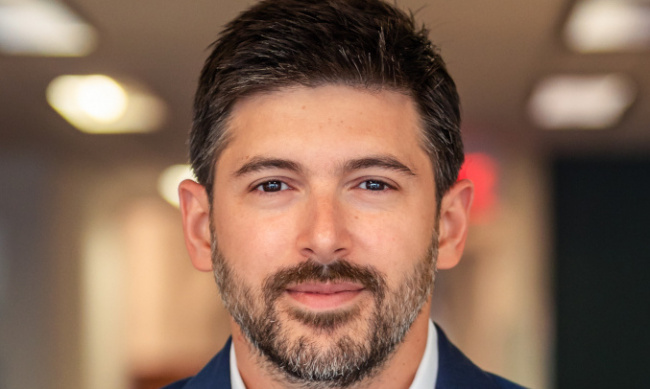
On the Strategy for 'Disney Lorcana,' the Role of Channels for Ravensburger, More
Posted by Milton Griepp on August 21, 2023 @ 3:17 am CT
MORE GAMES
Thursday July 31, 2025; 'D&D,' 'Riftbound,' and More!
August 8, 2025
The story of Gen Con 2024, as told through ICv2's staff photos, began on the morning of Thursday July 31, 2025 on the convention hall floor.
New Expansion Set for the Classic Fantasy Board Game
August 8, 2025
Hasbro will release HeroQuest: First Light, a new expansion for the classic fantasy board game, into retail.
MORE NEWS
Dark, Erotic Manga Based on Short Story by Edogawa Rampo
August 8, 2025
Maruo brings his signature “erotic grotesque” style to a dark tale by writer Edogawa Rampo.
'Thunder's Edge'
August 8, 2025
Fantasy Flight Games unveiled Thunder's Edge, a new Twilight Imperium 4E expansion.



